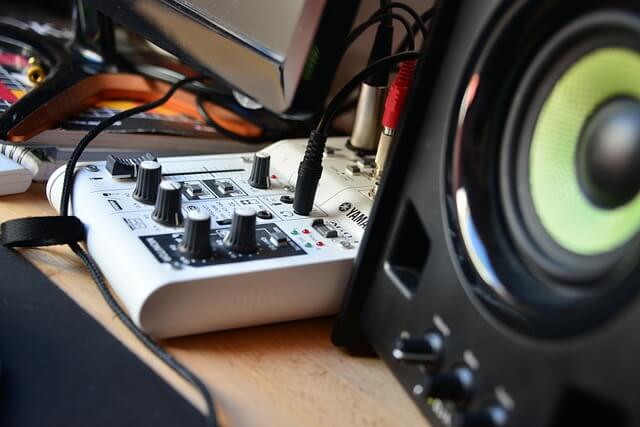Audio Production

Introduction to Audio Production
Audio production encompasses all aspects of sound creation, from recording to mixing and mastering. Whether for music, podcasts, film, or live events, having the right tools and setup is essential for high-quality results.
Here’s what you should know about audio production:
- Recording Tools: Microphones, audio interfaces, and preamps are crucial for capturing sound.
- Software: Digital Audio Workstations (DAWs) like Pro Tools, Logic, and Ableton allow for recording and editing.
- Monitors and Headphones: Essential for accurate sound playback during mixing.
- Mixing & Mastering: Involves refining sound balance using effects, EQ, and compression.
Explore our guides on tools, techniques, and professional tips to elevate your audio production skills.
Can you earn money in Audio Production?
Sound Production is a general profession/hobby, what sub-categories are there?
Here are some sub-categories of Audio Production that could be broken down from the general field:
- Music Production – Creating, recording, and mixing music tracks.
- Podcast Production – Recording and editing podcasts.
- Voice-Over Recording – For commercials, films, or video games.
- Live Sound Engineering – Handling audio at live events and performances.
- Sound Design – Creating custom sound effects for multimedia.
- Post-Production Audio – Editing and mixing sound for film and television.
- Broadcast Audio – Managing audio for radio or TV broadcasts.
These categories can be used for more targeted guidance on the website.
Is it expensive to get started in Audio Production?
Starting in audio production can vary greatly in cost depending on your goals and the equipment you choose. Here’s a breakdown:
-
Basic Setup: $500 – $1,500
- Entry-level audio interface
- Studio-quality microphone
- Headphones
- Basic recording software (DAW)
-
Mid-Range Setup: $1,500 – $3,000
- Higher-end interface with more inputs
- Studio monitors
- Multiple microphones for versatility
- Acoustic treatment for your recording space
-
Advanced Setup: $3,000+
- Professional-grade equipment including mixers, controllers, and premium monitors
You can start small and upgrade as your skills and needs grow.
Essential Tools across many Audio Production Fields
In audio production, many essential tools are used across various subfields, whether you’re working in music, podcasts, or sound design. Here are the most important tools:
- Digital Audio Workstation (DAW): Software for recording, editing, and mixing audio (e.g., Pro Tools, Ableton Live).
- Audio Interface: Connects instruments and microphones to your computer.
- Studio Monitors: High-quality speakers for accurate sound.
- Microphones: Various types (dynamic, condenser) for different recording needs.
- Headphones: For detailed monitoring.
- MIDI Controller: For composing and manipulating digital instruments.
- Cables and Connectors: Necessary for linking all equipment.
- Pop Filters: Reduces vocal plosives during recording.
- Acoustic Treatment: Panels or foam to optimize room sound.
Educational Resources for General Audio Production
Online Resources
- Coursera – Audio Production Courses: Offers a range of classes for audio production, from beginner to advanced levels. Visit Coursera
- Produce Like a Pro (YouTube): Provides tips, tutorials, and walkthroughs on music production techniques. Visit Produce Like a Pro
- Reddit – Audio Production: A community where audio producers share advice, tips, and gear recommendations. Visit Reddit
Book Resources
- “Modern Recording Techniques” by David Miles Huber: Covers the entire production process.
- “The Mixing Engineer’s Handbook” by Bobby Owsinski: A great resource for mixing.
- “Mastering Audio: The Art and the Science” by Bob Katz: A comprehensive guide to mastering audio.
These resources will help improve your skills in general audio production.
Are there Audio Production communities or blogs that could be helpful?
- Gearspace – A leading forum for audio engineers, producers, and enthusiasts, focusing on gear discussions and tips. Visit Gearspace
- Production Expert – Offers tutorials, reviews, and industry news, with a focus on Pro Tools, Logic Pro, and Studio One. Visit Production Expert
- The Recording Revolution – A blog dedicated to music recording and production, with guides for beginners and pros. Visit The Recording Revolution
- Reddit – Audio Engineering – A community where professionals and hobbyists share advice, tips, and experiences. Visit Reddit
Frequently Asked Questions (FAQ)
-
-
What do I need to get started in audio production?
- You’ll need a computer, audio interface, digital audio workstation (DAW), microphones, headphones, and studio monitors.
-
Is audio production a good career?
- Yes, audio production offers many career paths in music, film, podcasting, and broadcasting.
-
Do I need a degree to become an audio producer?
- While not required, formal education can help, but practical experience and building a portfolio are essential.
-
What is a DAW?
- A Digital Audio Workstation (DAW) is software used to record, edit, and produce audio.
-
How can I improve my audio mixing skills?
- Practice regularly, study audio theory, watch tutorials, and seek feedback from online communities.
-
Ad Notice:
ToolFinder is a site as a free service. We do not charge a fee, and so we have ads on our site to help support development cost and basic time input.
We may also have links on our site to others for products - known as affiliate links - you will Not pay more by utilizing these links, but the merchant would provide ToolFinder a fee for the referral. As an Amazon Associate I earn from qualifying purchases.

